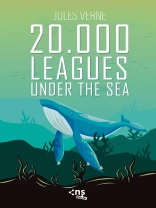Dive into a thrilling adventure in Jules Verne’s 20000 Leagues Under the Sea! When a monstrous sea creature terrorizes ships, Professor Aronnax, his loyal assistant Conseil, and daring harpooner Ned Land are swept into an electrifying chase. But what they find isn’t a beast—it’s the Nautilus, a powerful submarine commanded by the mysterious Captain Nemo. Trapped beneath the ocean’s surface, they embark on a whirlwind journey through underwater realms, face giant squids, uncover shipwrecks, and witness breathtaking wonders. Packed with suspense and action, this classic tale is a pulse-pounding ride from start to finish!
Придбайте цю електронну книгу та отримайте ще 1 БЕЗКОШТОВНО!
Мова Португальська ● Формат EPUB ● Сторінки 100 ● ISBN 9786555618983 ● Розмір файлу 4.9 MB ● Видавець NS English ● Місто Barueri ● Країна BR ● Опубліковано 2024 ● Завантажувані 24 місяців ● Валюта EUR ● Посвідчення особи 9965349 ● Захист від копіювання Adobe DRM
Потрібен читач електронних книг, що підтримує DRM












